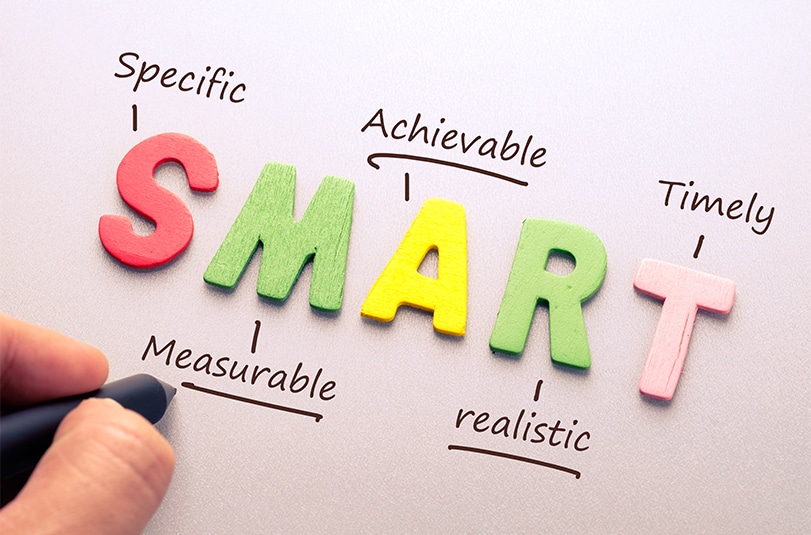 5-star Fitness
5-star Fitness
 5-star Fitness
5-star Fitness

The start of a New Year is a great time to reflect on the past year and set new goals for the year ahead. At PFC we know the important roll our mind plays in our overall health. That’s why we have an entire department dedicated to how we think. Sarah Speers is our Behavioral Therapist in charge of the Think Department here at PFC, and is here to share with us tips for successful goal setting today. So sit back, take some notes, and get ready to set some powerful goals for 2019!
1. Identify your WHAT & WHY
When coming up with a goal, we need to have a concrete reason we want to accomplish this goal. This will give the goal meaning and purpose and give us motivation to accomplish it. To help find your why for a goal, ask yourself “why?” 3 times to uncover the true meaning it has for you. This will help you dig deeper into the real, underlying reasoning behind the goals you want to put in place.
For example:
I want to lose 35 pounds by June
Q: Why? A: I’ll feel better
Q: Why will you feel better? A: Because I’ll be able to do some of the things I love to do again, and my quality of life will improve
Q: Why do you want to do those things you love? A: Because those activities make me feel complete as a person, and without that part of me I feel incomplete
2. Determine if you’re ready to make a change
Sometimes in life we set lofty goals for ourselves, but never fully commit to the life changes the goal will require. We like the outcome promised, but are unwilling to accept the process that’s going to get us there. While setting a goal, ask yourself if you’re willing to accept the sacrifices required to achieve your goal. Be honest with yourself about what needs to change and if you’re willing to give up old habits.
For example:
Goal: Going to the gym 3 times a week before work
Sacrifice: Going to bed early, so you can wake up early to get to the gym before work
Question: Are you willing to dedicate yourself to a bedtime so that you can feel rested for an early morning gym session? What other steps are required to make this happen?
3. Identify the obstacles and barriers standing between you and your goals
We may have great intentions with our pursuit to reach the goals we set for ourselves, but if we don’t take care of the obstacles and barriers, our efforts will be unsuccessful. Ask yourself who, what, where, and when might get in the way. Cover all of your bases. Once you’ve identified these obstacles and barriers, come up with a contingency plan.
For Example:
If (obstacle or barrier) happens, then I’ll (action you’ll take) .
Goal: Pack a healthy lunch for work instead of eating out or grabbing junk food to eat at work.
Contingency plan:
• If my coworker brings a bag of bagels for everyone at lunch time, then I will say “thanks for the offer, but I’m full from my own lunch that I brought today.”
• I will prep salads and hard boiled eggs on Sunday night so that if the week gets busy, I’ll have healthy lunches already prepared.
To help with this process, remind yourself of your why often. Also, beware of the instant gratification trap. In the moment of making a decision, your brain is often thinking about your present self and not the goal you set for your future self. Good things take time. Learn to be patient with the process.
Now how do we set goals that will improve our life and that we can successfully achieve?
We want to set SMART goals. You are 2-3 times more likely to stick to your goal if you make a specific plan for when, where, and how you’ll reach your goal. SMART goals stand for:
-Specific
-Measurable
-Achievable
-Realistic
-Time Bound

Get specific. What do you want to accomplish and why?
How can you make your goals measurable? How will you measure your progress? How will you know when you’ve reached your goal?
Make sure your goals are achievable. What steps will you take to achieve these goals?
Is the goal realistic? Do you have the resources to accomplish the goal? Is the goal in line with your long-term objectives for your life?
Lastly, keep your goals time-bound. How long will it take to accomplish? When will you aim to reach this goal? Set a deadline for yourself.
Along with making your goals SMART, make sure you write down your goals. Did you know that you are 42% more likely to achieve your goals if you write them down? Better yet, put your written down goals somewhere that you’ll look at them often as a constant reminder to keep you on track.
“The real value of setting goals is not the recognition or reward, it’s the person we become by finding the discipline, courage and commitment to achieve them.”